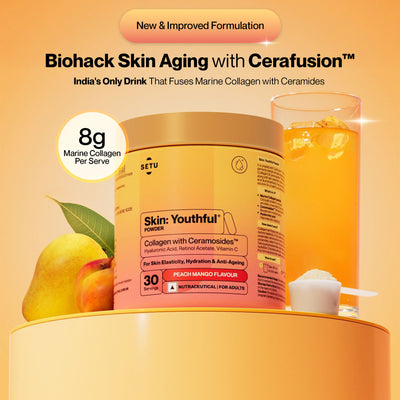Glutathione - Uses, Side Effects & More
19 Feb 2024
Glutathione - Uses, Side Effects & More
Introduction
Have you ever heard of glutathione? It's like the body's own superhero, defending our cells against damage and playing a crucial role in our immune system. This tiny yet mighty molecule is often hailed as the "master antioxidant" and for good reason. In this blog, we'll dive into the world of glutathione, exploring its uses, side effects, and the benefits it offers our body. So buckle up, and get ready to learn all about this powerful antioxidant!
What is Glutathione?
Definition and Importance
Glutathione is a powerful, naturally occurring antioxidant that's made up of three amino acids: cysteine, glutamate, and glycine. This crucial molecule is produced inside every cell of the human body, with particularly high concentrations found in the liver. It's often hailed as the "master antioxidant" due to its essential role in maintaining oxidative balance, supporting the immune system, detoxifying harmful substances, and rejuvenating other antioxidants. The body's glutathione levels are a good indicator of overall health and well-being, emphasizing the importance of this antioxidant in our daily lives.
Role as an Antioxidant
At its core, glutathione is a defender and maintainer of cellular health. It works by neutralizing harmful free radicals and reactive oxygen species (ROS), protecting cells from damage and inflammation that can lead to chronic diseases and aging. But that's not all – glutathione also helps regenerate other antioxidants, such as vitamins C and E, boosting the body's ability to fight off oxidative stress. This continuous battle against free radicals underscores glutathione's crucial role in maintaining our health, vitality, and longevity.
Uses of Glutathione
Skin Health and Brightening
Glutathione has become increasingly popular in the beauty and wellness industry, particularly for its skin health benefits. It is known to contribute to brighter, more radiant skin by inhibiting the production of melanin, which is responsible for pigmentation. Many people turn to glutathione supplements and topical products to achieve a more even skin tone and reduce the appearance of dark spots and blemishes. Beyond its cosmetic benefits, glutathione also supports skin health by protecting it against oxidative damage, which can lead to premature aging and skin conditions.
Liver Detoxification
The liver is our body's main detox organ, and glutathione plays a pivotal role in its detoxification processes. Glutathione helps break down and eliminate toxins, heavy metals, and waste products from the body. It supports the liver in neutralizing and removing harmful substances, thus preventing them from causing damage and promoting a healthy liver function. For individuals exposed to high levels of pollutants or those looking to support their liver health, supplementing with glutathione can be especially beneficial.
Immune System Support
Glutathione strengthens the immune system in several ways. Firstly, by protecting cells from oxidative stress and damage, it ensures that immune cells remain healthy and functional. Moreover, glutathione enhances the proliferation of lymphocytes, which are critical cells for the immune response, helping the body fight off infections and diseases more effectively. With a strong, well-functioning immune system, the body is better equipped to deal with pathogens and maintain overall health.
Anti-Aging Properties
Thanks to its antioxidant properties, glutathione plays a significant role in combating the signs of aging. By protecting cells from the damaging effects of free radicals, it slows down the aging process, promoting healthier, more resilient skin. Additionally, glutathione supports mitochondrial health, which is crucial for energy production and cellular vitality. Keeping our glutathione levels optimal can help us look and feel younger by preserving physical health and slowing down the visible signs of aging.
Benefits of Glutathione
Glutathione, often hailed as the “master antioxidant”, offers a multitude of health benefits that are nothing short of fascinating. From boosting your immune system to giving your skin that much-coveted glow, this powerful antioxidant does it all.
Boosts Immune Function
Possessing the ability to fortify your body’s first line of defense, glutathione plays a pivotal role in boosting your immune function. It aids in the production of lymphocytes, which are the cells responsible for your body's immune response. Regular intake of glutathione can help keep illnesses at bay by ensuring your immune system is performing at its peak.
Enhances Skin Health
Who doesn’t want radiant and youthful-looking skin? Glutathione is here to grant that wish! This mighty antioxidant is known to lighten skin by reducing the production of melanin, which is responsible for the pigment in your skin. Besides giving you a brighter complexion, it also helps in combating wrinkles and fine lines by aiding in the detoxification process, which in turn, promotes healthier, more vibrant skin.
Detoxifies the Body
Our bodies are constantly exposed to toxins through the environment, the food we eat, and the products we use. Glutathione acts like a superhero for our cells, protecting them from the damage caused by free radicals and toxins. It supports the liver, which is our main detox organ, in eliminating harmful substances from our body, thereby promoting overall health.
Can Improve Symptoms of Certain Chronic Diseases
Glutathione’s anti-inflammatory and antioxidant properties have shown promise in improving symptoms of certain chronic diseases, such as Parkinson's disease, Alzheimer's disease, and liver disease. By reducing oxidative stress and combating inflammation, glutathione can play a supportive role in the management of these conditions, potentially improving the quality of life for those affected.
Potential Side Effects of Glutathione
As with anything beneficial, there’s always another side to the story. While glutathione is generally considered safe for most people, there are a few potential side effects to be aware of.
Allergic Reactions
Some individuals may experience allergic reactions when taking glutathione supplements or receiving injections. Symptoms may include rash, itching, or even difficulty breathing. If you suspect you’re having an allergic reaction, it's important to discontinue use and consult with a healthcare provider immediately.
Digestive Issues
Ingesting glutathione supplements may lead to digestive issues for some people. Common complaints include bloating, abdominal cramps, or diarrhea. These symptoms are usually mild and often resolve on their own, but if they persist or cause discomfort, it might be best to reconsider your glutathione intake.
Interactions with Medications
It’s crucial to note that glutathione can interact with certain medications, either diminishing their effectiveness or enhancing their side effects. Antacids, for instance, can interfere with the absorption of glutathione, while it may potentiate the effect of immunosuppressants. Always talk to your healthcare provider before adding glutathione or any supplement to your regimen, especially if you are on prescription medications.
In summary, glutathione is a powerful compound with a plethora of benefits ranging from enhancing immune function to detoxifying the body and improving skin health. However, potential side effects and interactions with medications underscore the importance of proceeding with caution and consulting with a healthcare professional before embarking on supplementation.
How to Increase Glutathione Levels?
Boosting your glutathione levels can support your body's ability to fight oxidative stress and improve your overall health. Here are a few strategies to consider.
Dietary Sources
Incorporating foods rich in sulfur and the amino acids that makeup glutathione can naturally increase its levels in your body. Focus on:
- Fresh fruits and vegetables, especially those high in Vitamin C and selenium, such as oranges, strawberries, and broccoli.
- Foods rich in sulfur, like garlic, onions, and cruciferous vegetables including kale and Brussels sprouts.
- Protein-rich foods like lean meat, fish, eggs, and legumes, which provide the essential amino acids for glutathione synthesis.
Supplements
While getting nutrients from food is best, supplements can also help raise glutathione levels. While a healthy diet lays the foundation for glutathione production, supplementation acts as a crucial ally in ensuring your body has the necessary components for optimal levels. Supplements provide targeted support, particularly when dietary intake may be insufficient.
Setu Nutrition Skin: Renew – Glutathione supplements, for example, are formulated with not only 500 mg of the master antioxidant, but also 40 mg of vitamin C to enhance absorption.
By combining a healthy diet with strategic supplementation, you create a comprehensive approach to fortify your body against oxidative stress and enhance glutathione levels.
Consider other supplements as well, such as:
- Whey protein: It's rich in cysteine, one of the amino acids needed for glutathione production.
- N-acetylcysteine (NAC): A supplement form of cysteine that has been shown to increase glutathione levels.
- S-adenosylmethionine (SAMe): Although primarily used as a mood enhancer, it can also boost glutathione levels in people with a deficiency.
Before starting any supplement, it's essential to talk to a healthcare professional to ensure it's suitable for you. The safest and most effective supplement is to take Glutathione itself, but make sure you’re consuming a safe, optimal dose of 500 mg. If the formula contains antioxidant boosting ingredients, like Vitamin C, it impacts your glutathione levels better, and this is visibly observed in better skin health. You can find this optimal dose in Setu Skin: Renew – Glutathione.
Lifestyle Changes
Certain lifestyle choices can support your body's natural glutathione production.
- Exercise regularly: Physical activity can boost your body’s antioxidant defense system, including glutathione levels.
- Minimize alcohol consumption: Excessive alcohol can reduce glutathione levels, so moderating intake can help maintain them.
- Get enough sleep: Quality sleep is crucial for maintaining optimal glutathione levels and overall health.
Incorporating these dietary sources, supplements, and lifestyle changes can help you naturally increase your glutathione levels, supporting your immune system and overall well-being.
Conclusion
In sum, glutathione stands out as a formidable antioxidant with a multitude of uses, from boosting the immune system to detoxification. Despite its impressive benefits, it's essential to be mindful of potential side effects and consult a healthcare professional, especially for those considering it as a supplement. Whether through diet, lifestyle changes, or supplements, incorporating glutathione into your wellness routine could be a step toward better health, highlighting its role as a key player in our body's defense system.
Skin: Renew - Glutathione - Orange Flavour
- ₹1,994
- ₹1,994
-
₹2,600 - ( 23% OFF)
Categories
- Choosing a selection results in a full page refresh.
- Press the space key then arrow keys to make a selection.
this is the sidecart
















